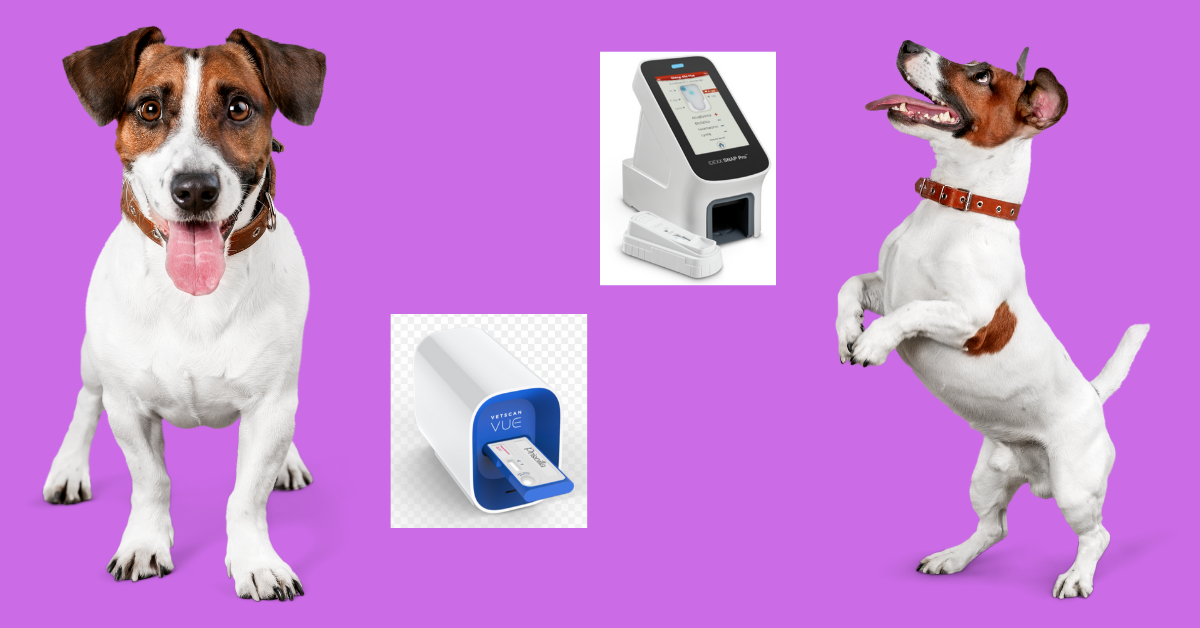In-House Heartworm Tests: A Comparison Veterinary Guide
The American Heartworm Society (AHS) recommends annual testing for heartworm disease in canine patients. While heartworm testing in cats can be trickier than in dogs, the AHS also recommends testing cats before starting them on heartworm prevention, to establish a baseline for each patient.
Heartworm disease can be a risk in just about any state in the US. Even in states that see less mosquito activity or have not been well-known for heartworm risk, there is still some possibility of exposure as more and more dogs from heartworm-prevalent areas travel with their owners, potentially exposing the local mosquito populations.
Should Heartworm Testing Be Done In-House?
As with many diagnostic tests, a veterinarian has the option of performing the test in their practice or sending a blood sample to an outside lab for analysis—or a combination of both.
For example, sending blood to an outside lab might make sense for healthy patients who are having a wellness bloodwork panel performed at their routine checkup.
Many standard bloodwork panels include a heartworm test, so it may make sense—financially for the client, and to save time for the veterinary team—to do the heartworm test at the lab since the blood sample is already being sent out.
However, prices and bloodwork panel options vary depending on the company and contracts/deals obtained, so be sure to compare the prices at your own clinic.
On the other hand, sometimes it makes sense to do a heartworm test in-house. For example, maybe a patient is symptomatic, and the veterinarian and pet owner both want an answer right away.
Or, maybe the client can only do basic care—vaccines and a heartworm test before starting heartworm prevention. For that client, it may make sense to do an in-house test so they can receive the results right away and know they can safely begin their dog’s prevention.
Here are some of the in-house heartworm tests available to veterinarians…
IDEXX SNAP Heartworm RT Test
IDEXX claims their test provides reference laboratory quality technology, for accurate results even with a low heartworm burden.
Their improved test sensitivity comes from a technology called “bidirectional flow,” which gives the sample two chances to bind to antibodies during the test, and from amplification. And specificity comes from a wash step that helps remove debris from the result window.
Abaxis VetScan and Zoetis Witness Heartworm Rapid Tests
Abaxis (now a part of Zoetis) offers a very simple-to-use test. It requires just one drop of blood and two drops of buffer, with no need to physically snap the test.
The company advertises that their product has a 12-month shelf life and does NOT need to be refrigerated. It also has a spot to write the patient’s name, to ensure there’s no mix-up of results if performing many tests in a short time frame.
Because of the non-refrigerated storage and the ease of writing a patient’s name on the test, this rapid test might be a good option for mobile or high-volume practices.
The Zoetis Witness test is very similar to the VetScan, and Zoetis sells each one in different quantities. For practices that mostly send their samples out to a lab, it may make sense to order the Witness test, which is available to be ordered in smaller quantities, so the tests don’t expire before a veterinary practice uses all of them.
Heska Solo Step Heartworm Test
The Heska test is also supposed to be simple to use, requiring 3 drops of blood and no need to snap the test. One advantage that Heska advertises is free confirmatory testing at their lab for positive results on the in-house test. This test can also conveniently be stored at room temperature.
There are separate versions of the test available for canines and felines, with the feline test evaluating for heartworm antibody rather than antigen.
A Few More Considerations
In-house tests are great options for screening for canine patients. However, any positive in-house test should be followed up with additional testing. This would usually involve confirming the positive test at an outside lab, and doing microfilaria testing. It’s important to have this additional confirmation and information prior to beginning any treatment.
Testing for cats is more complicated, too
Since heartworm-positive cats are more likely than dogs to be negative on an antigen test, an antibody test is the test of choice for them. However, antibody testing must be taken into account with the clinical picture and additional testing, since it documents exposure and is therefore not necessarily indicative of a current infestation.
Details and specifics of these tests may evolve over time. It’s important to check directly with the company for the most up-to-date information before making a purchase.
And finally, consider additional factors such as whether a special deal is available on these rapid in-house tests if you are already purchasing other equipment (like a hematology or chem analyzer, for example) from the same company. It may make financial sense to stick with the same brand. Be sure to check for any stipulations (like a minimum number of tests per month) in the contract, though. Also consider if it would make sense for your practice to do a combination test—which often features testing for Lyme, Anaplasma, and Ehrlichia in addition to heartworm—based on the risk in your local area.
With all these factors in mind, the best test for each individual practice varies, depending on their unique needs. Doing research, and asking for opinions from colleagues who have used the tests, can help with making this important decision.
Written by: Dr. Tammy Powell, DVM
Choosing an In-House Veterinary Chemistry Analyzer
Serum chemistry analysis is something most veterinarians use at least daily, and often many times throughout their workday.
These tests can be used for well-patient health checks, for pre-surgical bloodwork, and to assess an ill patient.
Having accurate results and a system for obtaining them is important. So, when choosing the best method or machine for your practice’s needs, it makes sense to put research and time into that decision. Here are some things to consider…
Should You Use an In-House Chemistry Analyzer, or Send Samples to an Outside Lab?
Each veterinarian has their own preference. And many veterinary practices use a combination of both—in-house analyzers for when results are needed immediately (such as for guiding the treatment plan for an ill or injured patient), and an outside laboratory for more routine testing.
Depending on the pricing structure, an in-house machine might also allow the practice to keep a higher percentage of the profits with each test performed—although this will probably depend on volume and other factors such as contracts and maintenance. Either way, there is some freedom to create your own system for your practice flow.
What Should a Veterinarian Consider When Choosing an In-House Chemistry Analyzer?
Here are a few important considerations before making a purchase…
Brand preference. Sometimes, a veterinarian or their team members prefer a particular brand due to previous experience or their relationship with the company or sales representative. Certain companies may offer discounts on other services or tests (such as snap tests, hematology analyzers, or consults with specialists) as a perk of using their equipment, which may make financial sense for a practice.
Contracts. Sometimes, particularly when equipment is heavily discounted, there may be “strings” attached, such as a requirement to perform a certain number of tests per month (and a penalty for not doing so). It’s always important to check the contract closely when making a purchase or signing an equipment lease.
Costs. Obviously, the cost of the chem analyzer itself should be considered. But remember to also factor in the costs of supplies (rotors, etc.) and the cost of each test relative to the cost to the client.
Machine specifics. Which specific tests are available (chem panels vary in size and comprehensiveness), and for which species? Are single tests available, for when you only need to retest one specific value (and how much do supplies for these tests cost versus the larger panels)? How fast are the results? How much blood is needed to run each test—and does the blood need to be spun down first?
Ease of operation. Is the machine simple and intuitive to use? Is training provided by the company that sells the machine? And, how are results added to a patient’s medical record?
Warranty and maintenance. Ask if there is a warranty included, what it covers, how long it’s good for, and if there’s an option to renew it once it runs out. Also, ask about routine maintenance costs, if there’s a helpline available if you have questions, and how fast an issue with the machine can be repaired/resolved.
“Real-world” performance. Ask around and see if any colleagues in your area use the equipment, and see what their experience has been. Or, see if the company will let you use the equipment on a short trial period before buying.
IDEXX, Abaxis, and Heska
These three companies are popular choices for veterinary practices. Here are the stated advantages of highlighted chem analyzers from each company…
IDEXX Catalyst One Chemistry Analyzer
IDEXX’s machine offers up to 34 parameters for chemistry, electrolytes, and immunoassay profiles in a single run. They note the practitioner has flexibility in terms of test comprehensiveness, including individual tests and preloaded CLIPs (pre-programmed chem profiles, or the option to create custom testing profiles). Results are available in minutes, and they advertise high accuracy from proprietary technologies. The machine is supposed to be simple to use (“load-and-go” with whole blood, serum, or plasma), for easy workflow. The IDEXX Catalyst One also features 24/7 auto-monitoring and maintenance.
Abaxis VETSCAN VS2 Chemistry Analyzer
The Abaxis analyzer is a small, portable option. It allows a practitioner many options for analyzing chemistry, electrolyte, acid-base, and immunoassay tests, with 12 testing profiles available. The machine is advertised to be easy to use (only a few steps to use, and minimal maintenance), with the capability of connecting to practice management software. The VETSCAN VS2 operates on as little as 2 drops of whole blood, serum, or plasma, with results in 12 minutes. It features its own intelligent Quality Control (iQC) system, which contributes to accuracy.
Heska Element DC5X Chemistry Analyzer
Heska advertises that their analyzer offers ease of use, high performance/volume capabilities, and “gold standard” technology. Ease of use means a fully automated process (“load and go”), an intuitive touchscreen, and easy integration with practice management software (with bi-directional communication). High performance means up to five samples per operation, and up to 190 tests per hour, with the option to preload up to 50 pipettes at once to save time. Veterinarians can choose from a broad, pre-programmed panel or customize to run only the tests needed. Only 10mL of sample is needed per test. Heska also advertises a free warranty.
Keep in mind that there are different analyzer models available from each company that have varying specifications and that details may change over time. So always confirm the specifics before making a purchase.
There are many options available, so it’s important to do some research and see what’s the best fit for an individual practice and if any special deals can be obtained when purchasing or leasing. It’s worth the time since the machine will probably be used frequently to serve the needs of your patients and clients.
Written by: Dr. Tammy Powell, DVM
Choosing an In-House Hematology Analyzer
Complete blood cell counts and qualitative analysis of blood cells are some of the most common diagnostic tests used by veterinarians.
Just a few of the many uses for hematology include diagnosing and monitoring anemia and looking for signs of inflammation, infection, cancers such as leukemia, and many other ailments.
Since blood tests are so crucial to the diagnostic plan for many ill patients and are often included in baseline testing for well patients, choosing the right machine for your practice’s needs is an important decision.
Why Choose an In-House Hematology Analyzer?
When it comes to blood cell analysis, veterinarians have the option of doing tests in-house or sending samples out to a lab. Each method offers its own advantages, and some vets even use a combination of both.
For example, when a sample is sent to an outside lab, there is usually the advantage of a specialist doing the qualitative/differential analysis. With in-house analyzers, it’s a good idea to include blood smears for increased accuracy and to look at cell morphology.
A veterinarian or their nurses can gain this skill through practice. However, a specialist may be able to detect subtle changes to blood cells that a general practitioner might not notice since the specialist looks at blood cells all day long. And, they can often confidently differentiate between artifacts and pathology when looking at cells on a blood smear.
On the other hand, the in-house analysis offers a lot of conveniences.
Sometimes, a veterinarian needs an answer quickly in order to start treating an ill patient right away. And worried pet owners might want answers as soon as possible.
Plus, depending on the specific contract the veterinarian has entered into, an in-house machine might allow the practice to keep a higher percentage of the profits with each lab test performed.
What Should a Veterinarian Consider When Choosing an In-House Hematology Analyzer?
Here are a few important considerations before making a purchase…
Brand preference. Maybe a veterinarian or their team has had a good experience with a particular brand. Or, if the company has any additional equipment or tests (such as snap tests) the practice is also interested in, maybe it would be possible to negotiate a better deal for everything together.
Contracts. Sometimes, particularly when equipment is heavily discounted, there may be “strings” attached, such as a requirement to perform a certain number of tests per month (and a penalty for not doing so). It’s always important to check the contract closely when making a purchase.
Costs. Obviously, the cost of the analyzer itself should be considered. But remember to also factor in the costs of supplies (rotors, reagents, etc.) and the cost of each test relative to the cost to the client.
Machine specifics. How fast are the results? How much blood is needed to run each test? Which species can be tested? And how are results added to a patient’s medical record?
Ease of operation. Is the machine simple and intuitive to use? Is training provided by the company that sells the machine?
Warranty and maintenance. Ask if there is a warranty included, what it covers, how long it’s good for, and if there’s an option to renew it once it runs out. Also, find out about routine maintenance costs, if there’s a helpline available if you have questions, and how fast an issue with the machine can be repaired/resolved.
“Real world” performance. Ask around and see if any colleagues in your area use the equipment, and see what their experience has been. Or, see if the company will let you use the equipment on a short trial period before buying.
IDEXX, Abaxis, and Heska
These three companies are popular choices for veterinary practices. Here are the stated advantages of highlighted analyzers from each company…
IDEXX ProCyte Dx Hematology Analyzer
IDEXX claims to have the industry’s most comprehensive CBCs (27 whole blood parameters plus fluid analysis options, with 17 species capabilities), with reference lab-quality results. They advertise dot plots with each in-house CBC report and extra help such as differential diagnoses and access to board-certified consultants at no charge. Results take two minutes.
Noted special capabilities include detecting band neutrophils and nucleated red blood cells, and including a reticulocyte count.
Abaxis VetScan HM5 Hematology Analyzer
This Abaxis machine reports 22 parameters in less than four minutes, including histograms. The company advertises compatibility with select practice management systems, ease of use, and minimal, quick maintenance with automated cleaning reminders.
Another benefit may be the small sample size requirement of just two drops of whole blood. It has capabilities for 15 species, as well as fluid analysis options. One noted special capability is a direct eosinophil count.
Heska HemaTrue Hematology Analyzer
Heska notes this machine can deliver accurate, reproducible results in 55 seconds, using just 20uL (about one drop) of blood. Results include 17 parameters and histograms. The color touchscreen interface is noted to be simple to navigate, with several species options.
The HemaTrue has daily automatic cleaning and quality control. The company states veterinarians have options such as a free analyzer use, low test prices compared to competitors and a free warranty. One additional advantage is a built-in blood tube mixer.
Keep in mind that there are different analyzer models available from each company that have varying specifications and that details may change over time. So always confirm the specifics before making a purchase.
There’s no one right machine that’s a fit for every veterinary practice. Instead, look at your practice’s individual needs and budget to find the hematology analyzer that’s the best fit for your team and for meeting the needs of your patients and clients.
Written by: Dr. Tammy Powell, DVM










